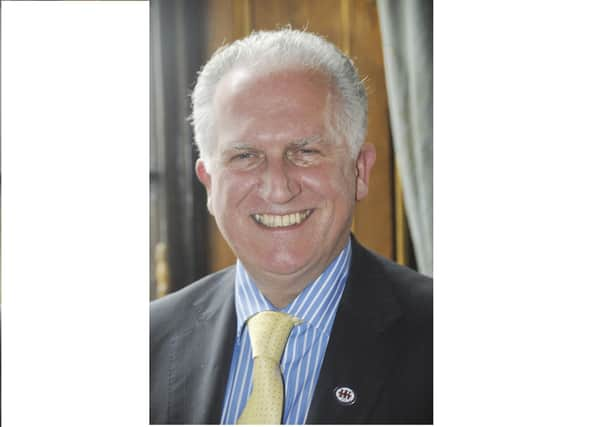Distinguished Royal Navy Falklands veteran at 'nerve centre' of UK military operations died after medical episode led to 'catastrophic' crash on A3(M)


Highly respected Commodore Malcolm Williams CBE failed to respond to calls for him to ‘slow down’ after losing consciousness while travelling in his Volkswagen Golf with his wife Sally on April 20 at 11.40am.
Cdre Williams, 69, had declared prior to the accident he ‘did not feel well’ before his car hit a Ford Ranger pick-up in the outside northbound lane near junction 3 at Waterlooville.
Advertisement
Hide AdAdvertisement
Hide AdIt then careered across the carriageway and hit a barrier and a stationary DAF truck on the hard shoulder.
Coroner Jason Pegg, paying tribute to Cdre Williams, said: ‘As a person he was a much loved husband, father and brother who served with distinction in the Royal Navy. ’
The crash left the ‘highly respected’ officer, who had heart disease, with multiple injuries including a severe bleed on the brain, a fractured skull, neck and left arm, Portsmouth Coroner’s Court heard.
Cdre Williams, of Gains Road, Southsea, was pronounced dead at the scene.
Advertisement
Hide AdAdvertisement
Hide AdThe inquest heard the naval officer, who was commanding officer of HMS Andromeda, HMS Scylla and later HMS Fearless during her deployment to the Far East for the handover of Hong Kong in 1997, was looking forward to seeing old friends on the day of the crash.
The inquest was told the car was gaining on the vehicle in front as Mrs Williams called out for her husband to ‘slow down, slow down’ before seeing he had a ‘lifeless look on his face’.
Giving evidence to the hearing, Mrs Williams, said she couldn’t remember the crash but added: ‘Apparently he did say, “I don’t feel very well” and I said “pull over”.’
Samual Cox, the driver of the Ford Ranger, said he saw Cdre Williams approach him from behind but did not initially realise he had been shunted before the car continued to undertake him.
Advertisement
Hide AdAdvertisement
Hide AdAfter looking across, the witness said: ‘I saw a male driver holding the steering wheel with the bonnet up in front of him. He seemed to be staring and was not reacting to what was going on.’
Mr Cox saw the car collide with a barrier and hit the rear of the DAF truck. He pulled over and rushed to help but could not find a pulse for Cdre Williams.
Brian Eagle, driver of the DAF lorry, said he saw Cdre Williams’ car ‘swerving’ with smoke pouring out in the outside lane before veering across the carriageway into a barrier before colliding with the rear of his vehicle. ‘It pushed my vehicle forward a long way and rolled it anti-clockwise,’ he said.
A police forensic collision investigation said there were ‘no defects’ to any of the vehicles with Cdre Williams’ Golf thought to be travelling at 66mph with ‘no braking or attempt to slow down’ during the incident.
Advertisement
Hide AdAdvertisement
Hide AdThe report added: ‘The onset of a medical episode rendered him incapable of reacting.’
Mr Pegg said Commodore Williams suffered an ‘unexpected cardiac event when driving causing him to lose consciousness and not take any action’.
He classified the death as being due to a road traffic accident due to the ‘catastrophic trauma’ of injuries but said there was an ‘element of natural causes’.
Questioned by Mrs Williams whether her husband was already dead, the coroner added: ‘Whether or not he was deceased or not we do not know but he was unconscious.’
Advertisement
Hide AdAdvertisement
Hide AdThe coroner said Cdre Williams deployment at the Armed Forces Northwood base meant he was at the ‘nerve centre of military operations in the UK’ - with his glittering career something his family should be ‘immensely proud of’.
His son Matthew told the inquest his father had helped ‘control the navy on a daily basis’ in his role and ‘served with great distinction’.
He was awarded CBE in the New Year’s Honours for co-ordinating the joint response to crises in Sierra Leone, Kosovo and humanitarian responses to natural disasters in Mozambique and Honduras.
Having left the naval service, he was appointed as chief executive of the Chichester-based Shipwrecked Mariners’ Society where he turned his attention to the welfare of merchant seafarers and fishermen.
Advertisement
Hide AdAdvertisement
Hide AdHe also helped spearhead the campaign to halt the abolition of cheques by banks and was a staunch advocate for proper representation and coverage of merchant seafarers during the November Ceremonies. He later was admitted into the Fraternity of the Younger Brethren of Trinity House.
During his naval career spanning 31 years, he also served as the Operations Officer in HMS Ambuscade during the Falklands War and was the navigator of HMS Illustrious and a Fleet Navigating Officer.
‘He was greatly principled and capable and someone to be proud of,’ his son added.
A message from the Editor, Mark Waldron
You can subscribe here for unlimited access to our online coverage, including Pompey, for 26p a day.
Comment Guidelines
National World encourages reader discussion on our stories. User feedback, insights and back-and-forth exchanges add a rich layer of context to reporting. Please review our Community Guidelines before commenting.
